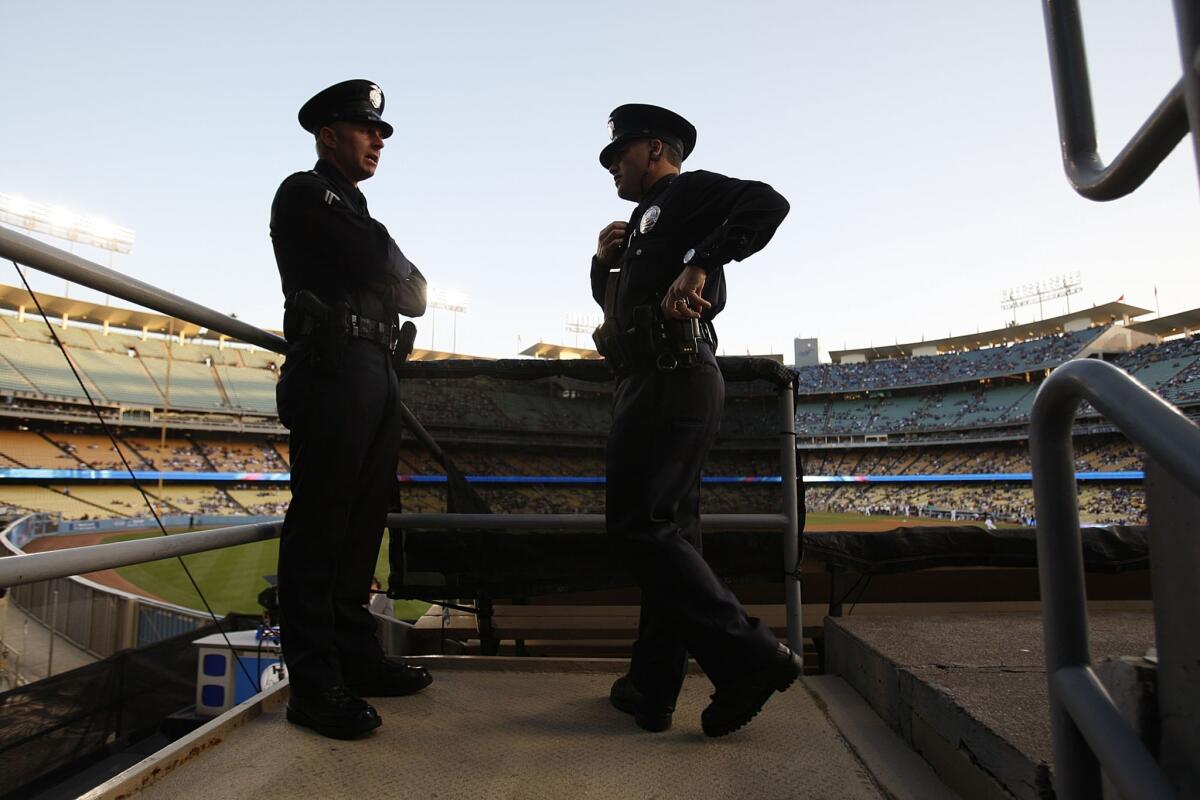Dodgers’ big gift moves LAPD closer to on-body video cameras

- Share via
Since joining the Los Angeles Police Commission last month, Steve Soboroff has been making calls to some of the city’s deepest pockets, asking them to pony up the $1 million he says he needs to jump-start an ambitious project: outfitting LAPD officers with small video cameras that would record their encounters with people.
His unorthodox approach to fundraising for the Los Angeles Police Department has paid dividends and got its latest boost Tuesday when the Dodgers and members of the team’s ownership group announced a $250,000 donation to the effort.
“Nothing is more important than the safety and welfare of the people of Los Angeles,” Mark Walter, the Dodgers’ controlling owner, told The Times. “As members of this community, the Dodgers are honored to be able to support the LAPD.”
The gift comes on the heels of other sizable donations, including another $250,000 from philanthropist Casey Wasserman and $50,000 each from former Mayor Richard Riordan and DreamWorks’ Chief Executive Jeffrey Katzenberg. Roberta Weintraub, a former member of the L.A. school board, gave $7,500.
With more than $600,000 committed so far and Wasserman planning to host a fundraising event soon, the commission president expressed confidence that he’d reach the million-dollar goal.
But as much as LAPD officials might be hoping that Soboroff will help with other big-ticket items in the future, the wealthy businessman quashed the idea.
“This is a one-time thing,” he said in an interview. “The cameras are such an important, unique thing that could make a tremendous difference.”
Soboroff has said the idea for the cameras came out of a series of meetings he had with police and elected officials, union leaders and a range of LAPD observers in the lead-up to his joining the board that oversees the Police Department. Chief Charlie Beck and the police union have expressed support for the idea.
Having an audio and video recording of traffic stops, shootings and other encounters is seen as a potentially valuable and cost-saving tool in guarding against officer misconduct and clearing cops when they are falsely accused of wrongdoing.
Soboroff raised eyebrows last month when, just minutes into his opening remarks as a commissioner, he called on the department to outfit officers with the cameras. It is unusual for commission members to take such a proactive stance on a matter, let alone for one to spearhead fundraising for a project.
If successful, the approach could bypass much of the city’s bureaucracy, internal politics and budget constraints that have hampered a similar effort by the department to install video cameras inside patrol cars. Currently, only about a quarter of patrol cars have the cameras.
Soboroff emphasized that he wants a range of voices to be involved in establishing the rules for when and how the cameras would be used. Along with police officials, the union that represents rank-and-file officers and civil rights groups would have a say in addressing privacy concerns for both officers and the people they encounter, he said.
“It’s important that the department doesn’t just come up with something and then tell people, ‘This is what we’re doing,’” he said.
Soboroff sketched out a rough schedule he hopes the department would be able to follow for getting cameras in place.
A three-month testing period, during which officers in various assignments would try a few dozen cameras lent by manufacturers, would run through January, he said. After that, he’s blocked off several months to negotiate a deal with whichever company the department selects and to finalize the purchase of about 500 cameras — about a third of the number he estimates will would be needed. By summer, he expects officers to be wearing the cameras.
The Police Foundation, a nonprofit group that raises funds for the LAPD, will receive the donations for the cameras and handle the purchase, Soboroff said.
Taser International, a leading maker of on-body cameras and one of the companies lending the department equipment to test, estimated each camera would cost about $700, Soboroff said.
In addition, he said, it costs about $50 a month for the data storage the department would need for each camera. At those rates, the million dollars Soboroff is trying to raise would cover the cost of the 500 cameras and storage capabilities for about two years.
Soboroff said if he fails to reach his goal of raising $1 million, the department would purchase as many cameras as it can with the money he does raise. Also, if he raises more than $1 million, the number of cameras purchased would go up.
After the first two years, Soboroff said he hopes the usefulness of the cameras would be clear enough that the City Council would step up with the funds needed to buy the remaining 1,000 cameras and to keep the project running.
And if it doesn’t see fit to do so?
“I guess I’ll go out and get the rest,” Soboroff said.
More to Read
Sign up for Essential California
The most important California stories and recommendations in your inbox every morning.
You may occasionally receive promotional content from the Los Angeles Times.











